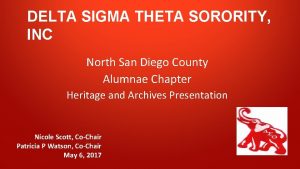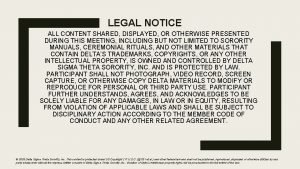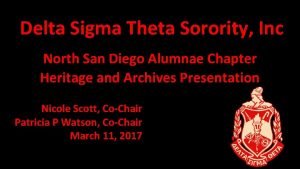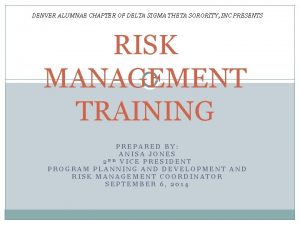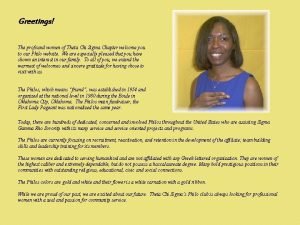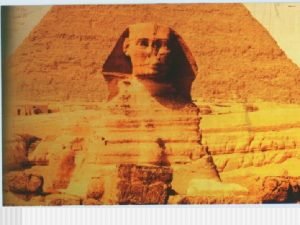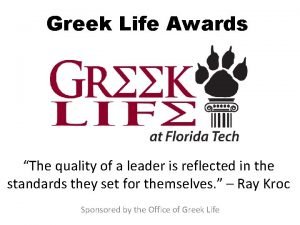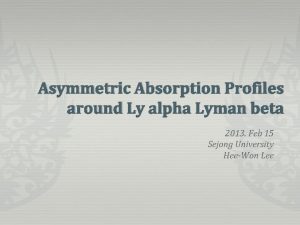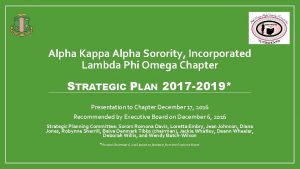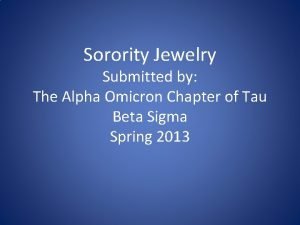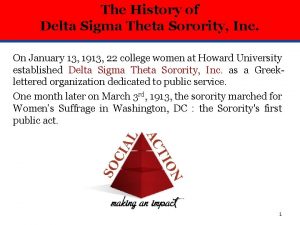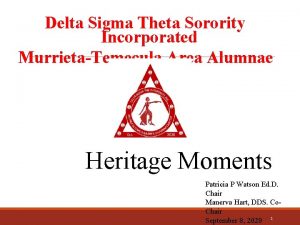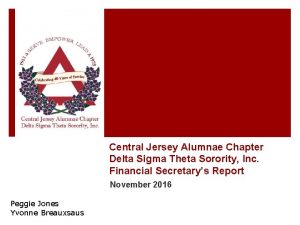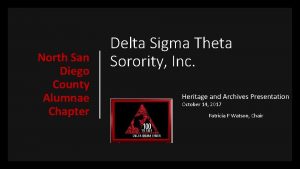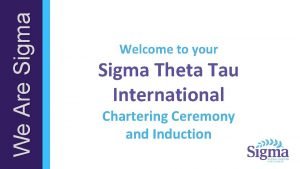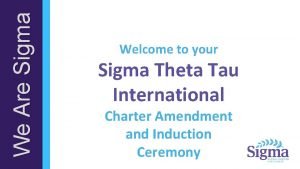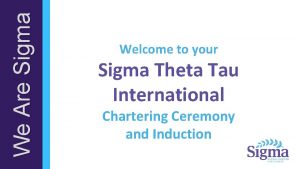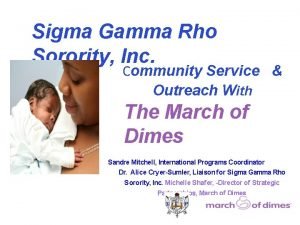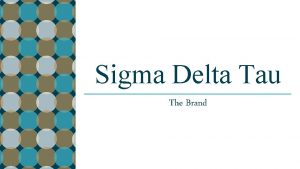DELTA SIGMA THETA SORORITY INC North San Diego























- Slides: 23

DELTA SIGMA THETA SORORITY, INC North San Diego County Alumnae Chapter Heritage and Archives Presentation Nicole Scott, Co-Chair Patricia P Watson, Co-Chair May 6, 2017

HERITAGE MOMENT…. The month of May pays tribute to Soror Marie Frankie Muse Freeman


BEGINNINGS…. Frankie Muse Freeman was born in 1916 in Danville Virginia to William and Maude Beatrice Smith Muse. She was named after her grandfather, a successful landowner, businessman and Virginia tobacco farmer well known in the community. Her family often told and retold the story of when the Ku Klux Klan came onto his property, how he shot their horses right from under them; then told them to ‘get those dead horses off his land!’ When Frankie was disobedient, she was often accused of being just like her granddaddy!

BECOMING…. As a child and teenager Freeman regularly faced racial discrimination. Neighborhood blocks, schools, movie theaters, and transportation systems were segregated in Danville in the early 1920 s, and Freeman promised herself that she would find a way to fight the discrimination she faced on a daily basis. At age sixteen, she enrolled in her mother's alma mater, Hampton Institute, which she attended between 1933 and 1936.

BEGINNINGS…. During her third year at Hampton Institute in 1936, Frankie Freeman decided to devote her professional life to becoming a lawyer and left Hampton Institute to study law at St. John’s University in New York. Unfortunately, St. John's would not accept the credits from Hampton University, and Freeman’s goal was put on hold for almost 10 years. Then, 1944 she was admitted to Howard University Law School and received a law degree in 1947. While a student at Howard Law, she became a member of Epsilon Sigma Iota sorority, the first American legal sorority for women of color.

MARIE FRANKIE MUSE FREEMAN In 1948, after writing to several law firms and not hearing back from them, Frankie Freeman decided to establish her own private practice and began with pro bono, divorce and criminal cases. She started in criminal law (and even though her first client was caught dragging a stolen bathtub downstairs, she managed a plea bargain). But, when 3 a. m. calls from clients started to interfere with her life as a wife and mother, she switched to civil law, which soon became civil-rights law. She was on the legal team that filed suit against the St. Louis Board of Education in 1949—well before the 1954 landmark Brown decision in Kansas!

HISTORIC LANDMARK CASE ! In 1954, Frankie Freeman was the lead attorney for the landmark NAACP case Davis et al. v. the St. Louis Housing Authority, along with Constance Baker Motley, Robert L Witherspoon and Thurgood Marshall then General Counsel for the NAACP. This decision ended legal racial discrimination in public housing within the city. The housing authority promptly hired her as its staff attorney from 1956 until 1970, first as associate general counsel and later as General Counsel.

Frankie Freeman had a straightforward, take care of business attitude. In 1954, she was denied service at an airport coffee shop in Louisville Kentucky while changing planes on the way to her mother’s funeral. When told she wouldn’t be served, she told the waitress that she wasn’t moving. “I’m a lawyer, ” she said, “and I know that this is illegal. ” She called a Black lawyer that she knew in town who filed a complaint against the host chain restaurant. Shortly after, Soror Freeman learned that the coffee shop had become desegregated! Now that’s…… TENACITY!

The United States Commission on Civil Rights The U. S. Commission on Civil Rights is a bipartisan, independent commission of the United States federal government, created in 1957, charged with the responsibility for investigating, reporting on, and making recommendations concerning civil rights issues in the U. S. During her tenure on the Civil Rights Commission she earned a reputation as a determined fact finder who always insisted upon a firsthand assessment of the situations that the committee was called upon to investigate. Many of the recommendations that emerged from the hearings conducted during her first years on the commission were later incorporated into the Voting Rights Act of 1965. In 1965, Frankie Freeman braved rural Mississippi to investigate the bombings of four Black churches, not long after several civil rights workers were murdered for trying to register Blacks to vote.

Frankie Freeman with her colleagues from the US Frankie Freeman and President Jimmy Carter Commission on Civil Rights in 1966. Freeman with First Lady Barbara Bush Soror Freeman with Lady Bird Johnson President Lyndon Johnson greets the Deltas, 1966

The National Executive Board of Delta Sigma Theta, Inc. were invited to meet with President Lyndon B Johnson and Vice President Hubert H Humphrey at the White House during the summer of 1966. Pictured V. P Humphrey greets: (Left to right) Dr Lynette Taylor, Executive Director, Nanette Lee Reynolds, National Second Vice President, Vice President Humphrey, Dr Geraldine P Woods National President and Frankie M Freeman, National 1 st Vice President. Frankie Freeman meets George H. W. Bush both having received Honorary Degrees from Hampton University Commencement Ceremony 1991

14 TH NATIONAL PRESIDENT Frankie M Freeman was inducted into the Lambda Sigma Chapter (renamed the St. Louis Alumnae Chapter) in 1950. She served as our 14 th National President from 1967 – 1971 having previously been 1 st Vice President under the tenure of Geraldine P Woods. However, during the 1967 convention, she was NOT included on the slate of candidates for National President. The slated nominee for National President was Thelma Thomas Daley. Realizing this, the St Louis chapter launched a campaign to put her name in nomination. In fact, she became the first and only National President whose nomination came from the floor rather than from the official slate of the Nominating Committee- and she won by a 3 -1 margin!

The Freeman Tenure… 1967 -1971 • Emphasis on public policy; with the riots, protests and other civil rights issues so prominently in the news • Began a program at the Regional Conferences whereby every soror would write a letter to their congressman on some issue; often civil rights, then march together with the letters to the mailbox which later evolved into Delta Days at the Nation’s Capital. • Broadened the scope and size of Teen Lift to include both Black and White teens and with the help of a grant, added a 4 day sensitivity training workshop to the program. • Delta Sigma Theta Executive Board was received in the White House by President Lyndon B. Johnson to discuss community issues and concerns • In 1968 the Unwed Mothers program was established • In 1970 Delta sponsored the East African International Women’s Seminar in Nairobi, Kenya. • In 1971 Delta and the Congressional Black Caucus co-sponsored National Policy Conferences on Education for Blacks, which focused on disparities and deficiencies in schools with high Black populations.

Number 1 and Number 14 Oh, To be a Delta Girl…… Delta Sigma Theta event in Chicago, late 1970 s. Left to right: Lady Carter, Frankie Freeman, Hortense Canady, Dorothy Height, Etta Moten Barnett. Soror Freeman pictured with Sadie T. M. Alexander, Ph. D. , 1 st National President (1919 -1923), and the nation's first woman to earn a Ph. D. in economics (1921). A distinguished attorney, she was among the founders of the National Bar Association (1925) and she was appointed to President Truman's Commission on Civil Rights (1945). Dorothy Height, Betty Shabazz & Frankie Freeman with Barbara Jordan at the 1971 Delta Convention

PRESIDENT’S CIRCLE Numbers 14, 16, 21, 22, 23 , 24 and 25

Accomplishments… • In March 1964, she was nominated by President Lyndon Johnson as a member of the United States Commission on Civil Rights. On September 15, 1964, the Senate approved Freeman’s nomination and she was officially appointed as the first black woman on the civil rights commission. • Soror Freeman was subsequently reappointed by presidents Richard Nixon, Gerald Ford and Jimmy Carter, and held the position until July 1979. • She was appointed as Inspector General for the Community Services Administration during Jimmy Carter's Administration in 1979. A year later, Ronald Reagan was elected president and demanded the resignation of Democratic inspectors general appointed by previous presidents. • Freeman returned to St. Louis, where she has practiced law ever since. In 1982, Soror Freeman joined 15 other former high federal officials who formed a bipartisan Citizens Commission on Civil Rights, a group committed to ending racial discrimination and devising remedies that would counteract its harmful effects.

Accomplishments • Frankie Muse Freeman was inducted into the National Bar Association’s Hall of Fame in 1990 • In 2007, she was honored with a place on the International Civil Rights Walk of Fame at the Martin Luther King Jr. National Historic Site in Atlanta. • In 2011, she received the NAACP Spingarn Medal, the association's highest honor. Gov. Jay Nixon proclaimed July 28, the day she received the award, as Frankie Muse Freeman Day to recognize her for her work in advancing civil rights.

Accomplishments • Also that year she was named to the Academy of Missouri Squires, a nonprofit that honors the accomplishments of Missourians who have achieved "true greatness" — among them, Harry S Truman and Stan Musial. 2014, Spirit of Excellence Award from the American Bar Association Commission on Racial and Ethnic Diversity in the Profession February 5, 2015, President Barack Obama appointed Soror Freeman to serve as a Member of the Commission on Presidential Scholars 2016 Recipient of the inaugural Sister Mary Byles Peace and Justice Prize.

Soror Freeman has honorary doctorate degrees from: Hampton University of Missouri–St. Louis Saint Louis University Washington University in St. Louis Howard University Harris-Stowe State College Legacy and Honors

“Serve others, in any way you can, every day. ” Frankie M Freeman She has served on: National Council of Negro Women; Girl Scouts of the United States of America; Past Chair, the Urban League of Metropolitan St. Louis; YWCA Metro St. Louis City Chapter of the NAACP; Board member, Washington Tabernacle Baptist Church. Trustee Emeritus of the Board of Trustees of Howard University, Past Chair of the Board of Directors of The National Council on the Aging Inc. She is also a board member of the United Way of Greater St. Louis Board member Metropolitan Zoological Park and Museum District Board member St. Louis Center for International Relations.

SOROR FRANKIE MUSE FREEMAN Soror Freeman lives her life in service to others and has devoted her life to the work of equal justice under the law. She is a champion of civil rights, and her legacy of service is one of the many reasons she is a true legal pioneer. We will always remember your contribution to our treasured history!

REFERENCES Giddings, P. (1988). In Search of Sisterhood. Delta Sigma Theta and the Challenge of the Black Sorority Movement. Smith, J. C. ( 1996) Notable Black American Women II. Frankie Muse Freeman. History Happens Here. Missouri History Museum. http: //www. historyhappenshere. org/archives Freeman, F. (2003 ) A Song of Faith and Hope Colbert-Botchway, N. (2016) What I Learned from Legal Pioneer Frankie Muse Freeman, Esquire, The Connection Point for Women Lawyers. The Missouri Bar Assn. http: //www. mobar. org/Women. In. Profession Freeman, F. (2006). The History Makers http: //www. thehistorymakers. com/biography/honorable-frankiefreeman Freeman, F. National Leadership Visionary Project. http: //www. visionaryproject. org 'Frankie Muse Freeman
 Delta sigma theta san diego
Delta sigma theta san diego Delta sigma theta san diego
Delta sigma theta san diego Delta sigma theta pyramid preparation period day 4
Delta sigma theta pyramid preparation period day 4 Dorothy height delta sigma theta
Dorothy height delta sigma theta Delta sigma theta mission statement
Delta sigma theta mission statement Denver alumnae delta sigma theta
Denver alumnae delta sigma theta Fannie lou hamer delta sigma theta
Fannie lou hamer delta sigma theta San diego continuing education north city campus
San diego continuing education north city campus Phi delta theta university of oregon
Phi delta theta university of oregon Delta theta ratio options
Delta theta ratio options Delta gamma theta vega rho
Delta gamma theta vega rho Theta chi sigma
Theta chi sigma Theta mu
Theta mu Greek life superlatives
Greek life superlatives Sorority extension
Sorority extension Tulane fraternities
Tulane fraternities Lyman beta
Lyman beta Aka sorority mission statement
Aka sorority mission statement Amy tan sorority
Amy tan sorority Official sorority jewelry
Official sorority jewelry Abreviatura de bobina
Abreviatura de bobina Descripcion
Descripcion Delta g = delta g + rtlnq
Delta g = delta g + rtlnq What is delta g
What is delta g
